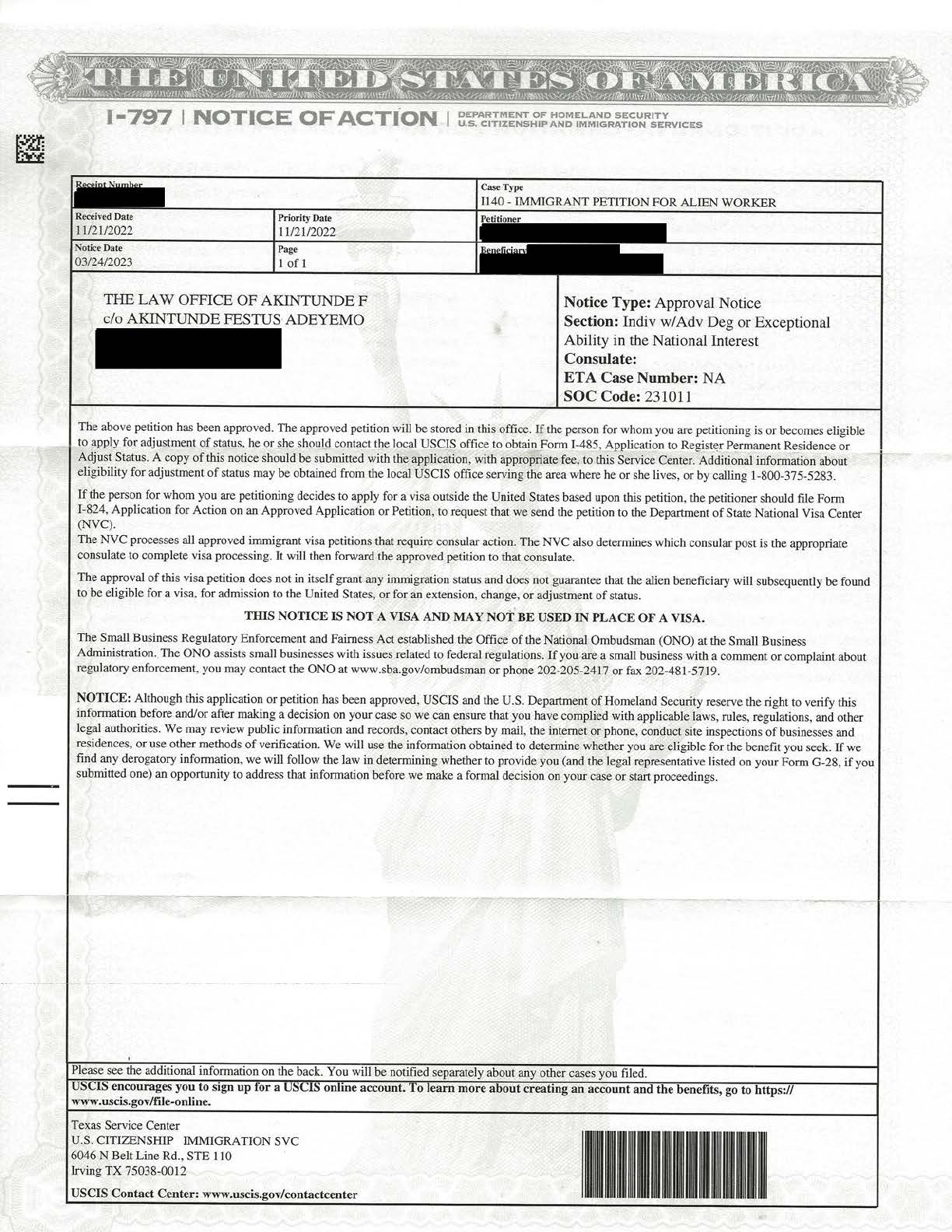LATEST EB-2 (NIW) WIN: MY FIRM SUCCESSFULLY REPRESENTED AN IVY-LEAGUE EDUCATED LAWYER: A CASE STUDY

Congratulations to my client: a successful EB-2 National Interest Waiver (NIW) brief!
Some minutes ago, I shared this life-changing news with my client — a young and ambitious lawyer from Nigeria — and she was super excited to hear that her EB-2 (NIW) petition was approved by the U.S. Citizenship and Immigration Services (USCIS). The Notice of Action was delivered today, March 31, 2023.
This case, which I filed in November 2022, was received by the USCIS on November 21, 2022.
EB-2 (NIW) is an employment-based second preference (EB-2) - National Interest Waiver (NIW) petition, and it is one of the statutorily approved ways for qualified foreigners to become permanent residents in the U.S., and, subsequently, become U.S. citizens.
To support this brief, I submitted 78 exhibits.
My talented client, whose highest level of education at the time of filing was a Master of Laws from one of the Ivy-League schools, was also educated in Nigeria. My client — who previously obtained a Bachelor of Laws from one of the best schools in Nigeria — will work to accelerate the process of bringing to market products and inventions developed by American innovators and researchers, which is consistent with the congressional intent expressed in the Bayh-Dole Act of 1980, I argued.
Yes, EB-2 (NIW) briefs for lawyers/physicians/teachers/pilots usually do NOT survive the analytical framework of the Matter of Dhanasar. Every case is different, which is why you should talk to a competent immigration lawyer. Anyway, to avoid a legal pitfall, and before I drafted this winning brief, I read a couple of denied cases (via the Administrative Appeals Office, AAO) involving those in the above-mentioned professions, helping me to marshal my legal argument. When I looked at the verifiable evidence provided by my client — including, but not limited to, scholarship offers from two other world-leading universities (the University of Oxford and the University of Cambridge), which she turned down — I knew that I could take on the case.
Most importantly, my brief argued that my client's proposed endeavor — providing bespoke legal counsel to American innovators exploring the national and global commercialization of their inventions in healthcare and biotechnology areas — will contribute immensely to relevant public and private initiatives that seek to bring novel biotechnology and healthcare solutions to the market.
Among other laws and national initiatives, the scope of her endeavor is also consistent with the goals and objectives of other relevant national laws (the Small Business Innovation Development Act of 1982; the Cooperative Research Act; The National Cooperative Research and Production Act of 1993; and the Omnibus Trade and Competitiveness Act, I argued.
Moreover, at the time of filing, the client had ZERO citation/peer-reviewed article, but my brief provided evidence to show that her proposed endeavor would play a significant role in healthcare and biotechnology areas, including, but not limited to, drafting and reviewing different partnership agreements, advising innovators on different legal aspects of their inventions, and the eventual commercialization and licensing of their products nationally and globally.
Additionally, under the third prong of the Matter of Dhanasar, I argued that her proposed endeavor would benefit the United States by, inter alia, contributing significantly to boosting American competitiveness, arguing further that providing innovative legal solutions to legal questions in the regular course of business are critical to commercial enterprises’ objectives. Another benefit, inter alia, is that her proposed endeavor provides early-stage innovators with in-depth innovative legal structures and strategic approaches to the wider innovation ecosystem.
Also, documenting her academic and professional achievements, among other things, and connecting that to the national interest of the United States — boosting American competitiveness — I argued that, as a matter of law, requiring my client to obtain a labor certification will impede her ability to undertake the proposed endeavor.
As a matter of fact, there was no RFE request, for the first legal brief survived all the three elements of the Matter of Dhanasar, 26 I&N Dec. 884 (AAO 2016). Among other cases and relevant sections of Immigration and Nationality Act cited, to support the brief, I emphasized the key standard of review in the Matter of Chawathe, 25 I& N Dec. 369, 375-76 (AAO 2010).
My client, a young and vibrant legal mind, can now focus on providing legal counsel to American innovators.
This is a big win for my client and her spouse (a derivative beneficiary): that is the American dream.
Again, congratulations to my client!
The Law Office of Akintunde F Adeyemo, PLLC is now accepting new clients in the areas of EB-2 (NIW) and EB-1A.
To read more about EB-2 (NIW), visit: https://www.akinalaw.com/blog/11/a-permanent-residency-option-for-foreigners
To read more about EB-1A, visit: https://www.akinalaw.com/blog/18/eb-1a-frequently-asked-questions
For a free (100%) case evaluation for EB-1A/EB-2 (NIW), contact the attorney-in-charge of The Law Office of Akintunde F Adeyemo, PLLC:
Akintunde F. Adeyemo, Esq.
Attorney, Counselor & Solicitor
734-318-7053 (Call, Text, Including WhatsApp)
Website: www.akinalaw.com
Email address: info@akinalaw.com
***For informational purposes only. Past success does not indicate the likelihood of success in any future legal representation***
***Attorney advertising***
#immigrationlawyer#eb2niw#immigrationattorney



